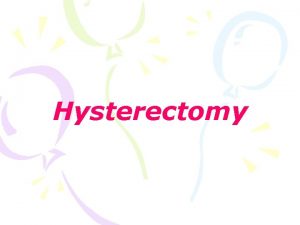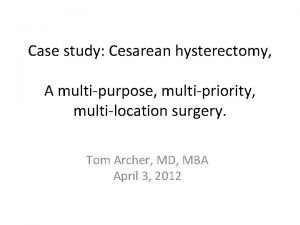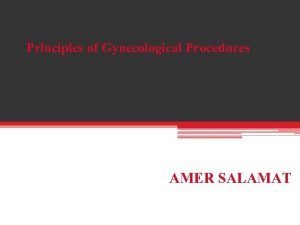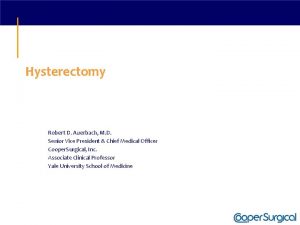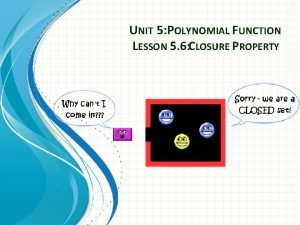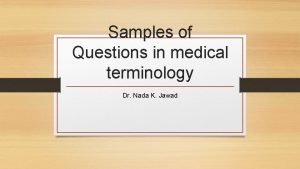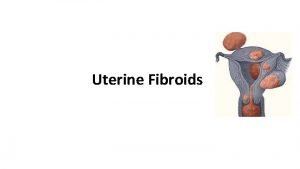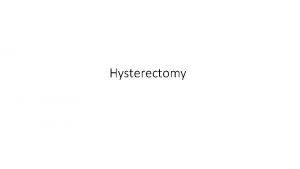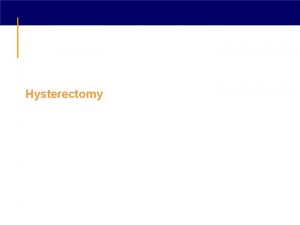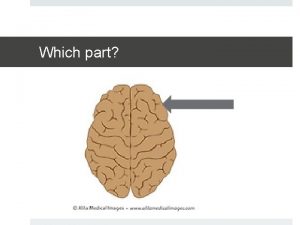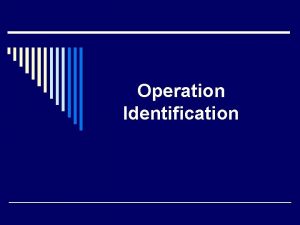Hysterectomy q Hysterectomy is an operation in which













- Slides: 13

Hysterectomy

q Hysterectomy is an operation in which the uterus is removed. The cervix, ovaries and/or Fallopian tubes might also be removed. q It may be done abdominally or vaginally. q Vaginal hysterectomy usually done for some cases of uterine prolapse.

Indications of hysterectomy v Obstetrical: Ø Rupture of the uterus. Ø Uncontrollable post-partum hemorrhage. Ø Placenta accreta. v Gynecological: Ø Inflammatory as some cases of genital tuberculosis. Ø Tumors: benign (ovarian tumors, fibroids) Ø Malignant (cervix, body and ovaries) Ø Displacement: some cases of uterine prolapse or chronic inversion. Ø Some cases of dysfunctional uterine bleeding.

Types of hysterectomies 1. Subtotal hysterectomy (partial) involves removing the body of the uterus, but leaving the cervix in place. done for post partum hemorrhage and rupture uterus. 2. Total hysterectomy involves removing the body of the uterus as well as the cervix, much better than subtotal. 3. Pan hysterectomy Total hysterectomy and bilateral of both ovaries 4. Radical hysterectomy is done specifically in the case of invasive gynecological cancer. Removal of the uterus, both tubes, and ovaries, the upper third of the vagina, the iliac and obtruator lymph gland. 5. Ultra radical hysterectomy Anterior excenteration →Removal of the bladder posterior excenteration →Removal of the bladder and rectum

Advantages of subtotal hysterectomy 1. -It is easier and quicker than total hysterectomy 2. There is less danger of injuring the bladder. 3. Less danger of pelvic infection. 4. The cervix left to act as a support for vagina. 5. The cervix discharge lubricates the vagina

Advantages of total hysterectomy 1. Provides better drainage of the operation area. 2. If the cervix is lacerated or infected, the source of irritant discharge is removed.

vaginal hysterectomy Indications of vaginal hysterectomy: 1. Some cases of uterine prolapse. 2. Some cases of dysfunctional uterine bleeding. 3. Some cases of cancer body

q Advantages of vaginal hysterectomy: 1. Absence of an abdominal scar. 2. Lower incidence of intestinal complication. 3. An associated genital prolapse can be treated at the same time. v Disadvantages of vaginal hysterectomy: 1. It is unsafe and difficult in the presence of pelvic adhesions. 2. The ovaries can not be removed in some cases. 3. It can not be done if the size of the uterus is larger than a 14 weeks pregnant uterus.

Postoperative Complications of abdominal hysterectomy 1. 2. 3. 4. 5. 6. 7. 8. 9. Shock. Hemorrhage. Infection, Intestinal complications as acute gastric dilatation. Pulmonary complications e. g. bronchitis, pneumonia, pulmonary collapse. Venous thrombosis (DVT, SVT. ) Post operative anesthetic complications e. g. Cyanosis, vomiting. Remote Complications e. g. vaginal discharge (infection), vaginal vault prolapse, low back ach, Menopausal symptoms e. g. sadness, irritability. (in younger female)

Methods of treatment q Deep breathing exercises: to improve alveolar ventilation. (to minimize changes in lung volume and gas exchange) from semi-fowler position, the abdominal muscle in slack to allow greater diaphragmatic excursion q Rolling to minimize trunk movement. q Coughing Two stage cough preceded by deep breathing (the 1 st raises the secretion, the 2 nd facilitate expectoration. Patient applies pressure on the incision by pillows or hands. q Huffing: accomplished by forceful expiration, If the patient unable to do coughing q Ankle circles: To minimize the occurrence of phlebitis and facilitate venous return. q Abdominal muscles exercises.

Aims of treatment Ø Pre-operative Psychological preparation for the operation. Ø Aims of pre-operative treatment: 1. To prepare the patient physically and mentally for the operation. 2. Teach her the exercises that will be done post operatively. 3. To improve circulation. 4. To improve respiration. 5. To strength the abdominal muscles

• Post-operative Aims: • To improve circulation. • To improve respiration and prevent chest complications. • To avoid muscle wasting. • To prevent postural problems Methods • The same like cesarean section except arm exercises. • Electrical stimulation to decrease pain (TENS). • Laser to decrease pain and enhance healing

 Most common site of ureteric injury during hysterectomy
Most common site of ureteric injury during hysterectomy Indications of hysterectomy
Indications of hysterectomy Cesarean hysterectomy steps
Cesarean hysterectomy steps Disadvantages of laparoscopic hysterectomy
Disadvantages of laparoscopic hysterectomy Hysterectomy
Hysterectomy What operations are polynomials closed under
What operations are polynomials closed under Suffix refers to eating
Suffix refers to eating Which of the following is a metal cutting operation
Which of the following is a metal cutting operation Example of unix operating system
Example of unix operating system Safety in blasting operation
Safety in blasting operation Objective of warehouse management system
Objective of warehouse management system Napalm vietnam war
Napalm vietnam war øjendråber efter grå stær operation
øjendråber efter grå stær operation Bonney hood incision
Bonney hood incision

